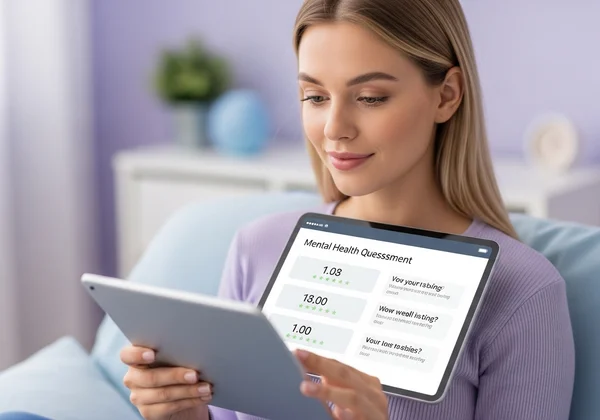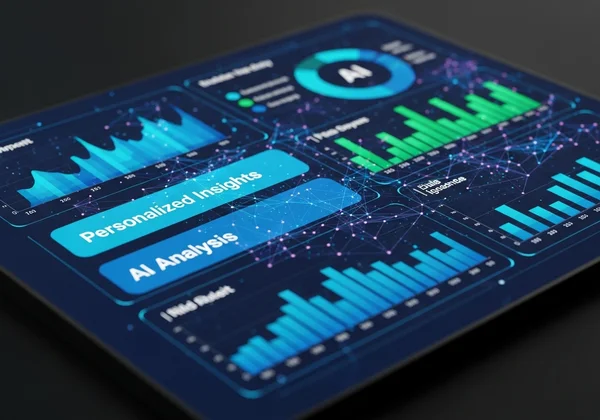EPDS Score Interpretation: What Your Score Means
July 13, 2025 | By Clara Maxwell
Pregnancy and postpartum are incredible journeys, but they can also bring big emotional shifts. It's totally normal for things to feel challenging at times, alongside all the joy. If you've recently taken the EPDS (Edinburgh Postnatal Depression Scale) test, you now have a score, and it’s natural to wonder, How is the EPDS score interpreted? This guide is designed to help you understand what that number means for your perinatal mental health, providing clarity and empowering you with knowledge. Understanding your score is the first step towards taking control of your well-being. For a confidential and scientifically-backed assessment, we invite you to take our free test on our platform.
Understanding Your EPDS Score: The Basics of Interpretation
Understanding your EPDS score is a crucial step in assessing your emotional well-being during pregnancy and after childbirth. This scale is a widely recognized tool, offering valuable insights into your mental health status. Knowing the fundamentals of its interpretation can empower you to make informed decisions about your care.
What is the EPDS and How is it Scored?
The Edinburgh Postnatal Depression Scale (EPDS) is a 10-item self-report questionnaire developed by Cox, Holden, and Sagovsky in 1987. It is designed to identify women who may be experiencing symptoms of perinatal depression, which includes both antenatal (during pregnancy) and postnatal (after childbirth) depression. Each of the 10 questions asks about how you have been feeling over the past seven days, focusing on common depressive symptoms like sadness, anxiety, self-blame, and sleep disturbances.
For each question, there are four possible responses, typically scored from 0 to 3, depending on the severity and frequency of the symptom. A higher score indicates more frequent or severe symptoms. The scores are then summed up to give a total EPDS scoring ranging from 0 to 30. The scale is a postnatal depression scale EPDS that helps to screen for a potential need for further assessment, not a diagnostic tool itself.

Why Your EPDS Score Matters for Perinatal Health
Your EPDS score provides a quick, confidential snapshot of your current emotional state. During the perinatal period, significant hormonal shifts, sleep deprivation, and the immense responsibility of caring for a newborn can profoundly impact mental health. An epds screening can help identify potential emotional distress early on, allowing for timely intervention and support. Early recognition of symptoms, whether subtle or pronounced, is vital for improving outcomes for both the parent and the baby. It helps you, your partner, and healthcare providers understand if you might benefit from further evaluation or support. Take a moment to start your screening today and gain clarity.
Normal EPDS Score Ranges: What 0-8 Means
If your EPDS score falls within the 0-8 range, this is generally considered a normal EPDS score, indicating a low likelihood of experiencing significant depressive symptoms. This range often reflects the typical emotional fluctuations that many new or expectant parents experience, sometimes referred to as the "baby blues." While these feelings can include mild sadness, irritability, or tearfulness, they are usually temporary and resolve within a couple of weeks without intervention.
Reassurance and Continued Self-Care Practices
A normal EPDS score is reassuring – it means you're likely adjusting well to the emotional demands of pregnancy or new parenthood. However, it's essential to remember that mental health is dynamic. Even with a low score, prioritizing self-care remains crucial. Continue to focus on adequate sleep, balanced nutrition, light physical activity, and maintaining connections with your support system. If you ever feel your mood shifting, remember that resources are available to help you monitor your well-being and stay proactive.

Navigating Moderate EPDS Scores: What 9-12 Indicates
A score between 9 and 12 on the EPDS suggests that you might be experiencing some mild to moderate symptoms of depression or anxiety. This range indicates a need for increased awareness and possibly proactive self-support. It’s a signal to pay closer attention to your emotional well-being.
Recognizing Mild Symptoms and When to Observe
In this epds depression screen range, you might notice symptoms like persistent low mood, increased anxiety, fatigue, or difficulty enjoying activities you once did. These aren't necessarily signs of severe depression, but rather indicators that your emotional well-being needs attention. It's important to differentiate these from the transient "baby blues." If these feelings persist beyond two weeks or interfere with your daily life, it’s worth observing them closely and considering speaking with a healthcare professional. Recognizing these early emotional shifts can make a significant difference.
Simple Strategies for Self-Support and Well-being
If your score is in this moderate range, there are many simple strategies for self-support you can try. Focus on practical steps like scheduling small moments of relaxation, ensuring you get enough rest (even if it means asking for help with the baby), and connecting with trusted friends or family members. Practicing self-care tips such as mindful breathing or gentle exercise can also be beneficial. Remember, it's okay to ask for help and to prioritize your well-being. Our platform offers personalized guidance to help you understand your results further and empowers you to access insights to navigate these feelings.

Understanding a High EPDS Score: What 13+ Implies
A total EPDS score of 13 or higher is generally considered a significant indicator of probable depression and suggests that you are experiencing notable symptoms that warrant immediate attention. This high epds score means it is highly recommended to seek professional support. While the EPDS is a screening tool and not a diagnosis, this score strongly indicates a need for a full clinical assessment by a healthcare professional.
When to Seek Professional Support Immediately
If your score is 13 or above, it is crucial to seek professional assessment without delay. This includes discussing your results with your obstetrician, general practitioner, midwife, or a mental health specialist. They can conduct a comprehensive evaluation, provide an accurate diagnosis, and recommend an appropriate treatment plan tailored to your needs. Remember, recognizing these symptoms and seeking help is a sign of strength, not weakness. Untreated perinatal depression can impact both the parent's and the baby's health and development. You are not alone, and help is available.

Immediate Support & Crisis Resources
If you're experiencing a high EPDS score, especially with thoughts of harming yourself or your baby (Question 10 on the EPDS), please seek crisis support immediately. You can:
- Call your local emergency services (e.g., 911 in the US, 999 in the UK, 000 in Australia).
- Go to the nearest hospital emergency room.
- Contact a crisis hotline. Many countries offer national helplines for mental health support.
- Reach out to a trusted family member or friend who can help you connect with professional assistance.
It's vital to remember that while the EPDS is a powerful screening tool, it's not a substitute for a professional diagnosis. It is essential to consult with a qualified healthcare professional for a complete evaluation and personalized advice. Your safety and well-being are our top priority.
Beyond the Number: The Power of AI-Powered EPDS Reports
Here, we believe in providing more than just a score. While the raw number offers a valuable initial insight, understanding your unique situation requires a deeper dive. This is where our key competitive advantage comes into play: our optional AI-powered EPDS reports. These reports move beyond basic score interpretation, offering a comprehensive and personalized analysis designed to give you a clearer picture of your perinatal mental health journey.
Gaining Personalized Insights into Your Mental Health
After taking the confidential EPDS screening on our site, you have the option to provide additional, voluntary background information. This allows our advanced AI analysis to generate a more nuanced and personalized report. This report doesn't just tell you your score; it helps you understand how different aspects of your life might be influencing your emotional well-being. It can highlight potential challenges, identify areas of strength, and offer context-specific insights that a simple number cannot. This unique feature empowers you with a more holistic understanding, guiding you toward targeted support and effective coping strategies. To see how these deeper insights can benefit you, we encourage you to explore our features and discover a new level of self-understanding.

Your Path Forward: Actionable Insights from Your EPDS Score
Understanding your epds score interpretation is a powerful first step on your perinatal mental health journey. Whether your score is low, moderate, or high, it serves as a guide, prompting you to reflect on your emotional well-being and consider appropriate next steps. Remember, an EPDS score is a screening tool, not a diagnostic one. It’s designed to help you and your healthcare provider identify potential risks, not to label you.
The most important takeaway is that you are not alone, and support is available. By taking the time to understand your perinatal mental health, you are taking a proactive step towards a healthier and happier experience for both yourself and your family. We encourage you to use resources like ours to stay informed and empowered. If you haven't taken the confidential and free assessment yet, or if you wish to explore the benefits of a personalized AI report, we invite you to start your journey today. Take control of your mental health journey.
Frequently Asked Questions About EPDS Scores
What is a normal EPDS score?
A normal EPDS score is generally considered to be 0-8. Scores in this range suggest a low likelihood of perinatal depression and often reflect the common emotional adjustments experienced during pregnancy or postpartum, sometimes referred to as the "baby blues." It's a reassuring indication of emotional well-being.
How is the EPDS score interpreted?
The EPDS score interpretation provides an indication of the severity of potential depressive symptoms. Scores of 0-8 are considered low risk, 9-12 suggest mild to moderate symptoms, and 13 or higher indicate a probable need for professional evaluation. Each question contributes to the total score, with higher scores reflecting more frequent or severe symptoms.
What to do after a high EPDS score?
If you receive a high EPDS score (13 or above), it is strongly recommended that you seek professional help immediately. This means consulting with your doctor, midwife, or a mental health professional for a full clinical assessment. They can provide a diagnosis and recommend appropriate treatment or support. Remember, a high score is a signal to seek help, and timely intervention can significantly improve outcomes. You can start your confidential screening and get immediate feedback by using our free EPDS screening tool.
Does EPDS screen for anxiety?
While the EPDS is primarily designed as a screening tool for depression, some of its questions do touch upon symptoms commonly associated with anxiety, such as panic, worry, and feeling overwhelmed. Therefore, a high EPDS score can sometimes indicate the presence of anxiety symptoms, even if the primary focus of the scale is depression. However, for a dedicated anxiety assessment, other specialized tools might be more appropriate.